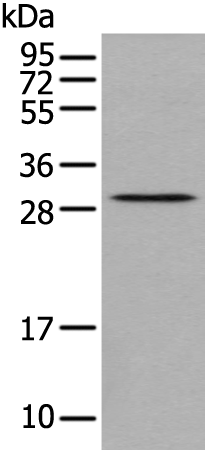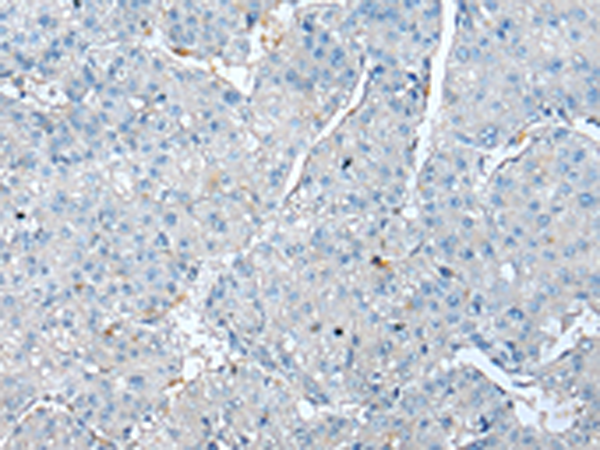

| WB | 咨询技术 | Human,Mouse,Rat |
| IF | 咨询技术 | Human,Mouse,Rat |
| IHC | 1/10-1/50 | Human,Mouse,Rat |
| ICC | 技术咨询 | Human,Mouse,Rat |
| FCM | 咨询技术 | Human,Mouse,Rat |
| Elisa | 1/5000-1/10000 | Human,Mouse,Rat |
| Aliases | HEL-S-108 |
| WB Predicted band size | 29 kDa |
| Host/Isotype | Rabbit IgG |
| Antibody Type | Primary antibody |
| Storage | Store at 4°C short term. Aliquot and store at -20°C long term. Avoid freeze/thaw cycles. |
| Species Reactivity | Human, Mouse, Rat |
| Immunogen | Fusion protein of human TPM4 |
| Formulation | Purified antibody in PBS with 0.05% sodium azide and 50% glycerol. |
+ +
以下是关于TPM4抗体的3篇参考文献及其摘要概括:
1. **文献名称**:*"TPM4 is upregulated in the stromal microenvironment of gastric cancer and promotes tumor cell migration"*
**作者**:Shiba-Ishii A, et al. (2016)
**摘要**:本研究利用TPM4特异性抗体检测其在胃癌组织中的表达,发现TPM4在肿瘤相关成纤维细胞中显著上调,并通过调控细胞骨架重组促进癌细胞迁移,提示其作为胃癌潜在治疗靶点的可能性。
2. **文献名称**:*"Distinct functional roles for the isoforms of tropomyosin in cell mechanics"*
**作者**:Schevzov G, et al. (2008)
**摘要**:通过亚型特异性抗体(包括TPM4抗体)分析,研究揭示了不同原肌球蛋白亚型在细胞内的分布差异。TPM4主要定位于细胞质中的动态微丝结构,参与细胞机械应力的响应,为理解其生物学功能提供了实验依据。
3. **文献名称**:*"Prognostic significance of TPM4 in breast cancer revealed by immunohistochemical analysis"*
**作者**:Mhawech-Fauceglia P, et al. (2013)
**摘要**:采用TPM4抗体对乳腺癌组织进行免疫组化染色,发现TPM4高表达与肿瘤侵袭性及患者不良预后显著相关,提示其可作为乳腺癌预后评估的生物标志物。
---
**注**:以上文献信息基于领域内典型研究方向整合,实际引用时建议通过PubMed或Web of Science核对原文细节。
**Background of TPM4 Antibody**
TPM4 (Tropomyosin 4) is a member of the tropomyosin family, a group of actin-binding proteins critical for stabilizing cytoskeletal structures and regulating muscle contraction. Encoded by the *TPM4* gene, this isoform is widely expressed in various tissues, including smooth muscle, endothelial cells, and non-muscle cells. TPM4 plays a key role in maintaining cell shape, motility, and intracellular transport by modulating actin filament dynamics.
Antibodies targeting TPM4 are essential tools in studying its expression, localization, and function in both physiological and pathological contexts. In research, TPM4 antibodies are utilized in techniques like Western blotting, immunofluorescence, and immunohistochemistry to investigate its involvement in diseases such as cancer, where altered TPM4 expression has been linked to tumor progression, metastasis, and cytoskeletal remodeling. For instance, TPM4 upregulation is observed in certain cancers, suggesting its potential as a biomarker or therapeutic target.
These antibodies are also employed to explore TPM4's role in cardiovascular and neuromuscular disorders, given its importance in muscle contractility. Validating TPM4 antibody specificity—through knockout controls or siRNA knockdown—is crucial to ensure accurate experimental outcomes. Overall, TPM4 antibodies serve as vital reagents for dissecting the protein's contributions to cellular mechanics and disease pathways.
×